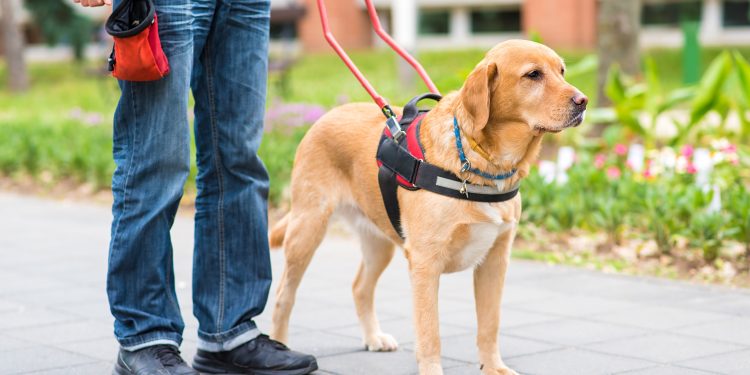by Toni Popkin
With 23 states having laws against the use of fake service dogs, it’s important to understand what a service dog is.
The American Disability Act (ADA) clearly defines a service dog as follows:
“A service dog is specifically task-trained to help an individual with a disability that substantially limits one or more life activities. Disabilities may include visual difficulties, hearing impairments, Post-Traumatic Stress Disorder (PTSD), seizures, ambulatory issues, mental illness, diabetes, autism, and more, depending upon the applicable law. However, to qualify, the task(s) must be related directly to assisting with the individual’s disability—not basic obedience, owner protection or pet tricks. Emotional support and comfort are not trained tasks. “Natural” alerts or “spontaneous abilities”do not qualify as trained tasks.”
• Service dogs are NOT PETS – They are fully trained to do specific tasks to assist one person who has a disability; they have been exposed to numerous situations a pet would not be exposed to and have learned to be non-reactive in these situations. In addition they have hours of working in the public in all types of situations including things such as leaving food alone when lying quietly on the floor in a restaurant; to walk in a grocery store or shopping center focusing only on their partner, ignoring other people, dogs, smells; or to ride public transportation if they need to with their partner. They are frequently exposed to everyday real-life situations, becoming comfortable in them, quiet in public, and able to adapt to going anywhere with their partner. It takes a lot of hard work and dedication to make a successful service dog team.
• There’s NO SUCH THING as a certified or registered service dog – Some programs that train and place Service Dogs will test them for public access, but this does not mean a Service Dog is certified or registered.
• Watch out for scams – Online scam sites SELL papers, vests, IDs, etc. to show that your pet is “certified” or “registered.” You spent money to make your pet a “pretend service dog,” or it shows that you don’t know the difference.
• Emotional support animals (ESA) are PETS – they are not specially trained to do anything; they just make you feel better. These dogs cannot go to any non-dog friendly establishment. Taking them in public wearing a vest causes problems: – They are not trained to ignore other dogs, and many service dogs have been attacked by them. – This now gives businesses a chance to question any trained service dog due to seeing behavioral problems with these pets. – They have not been exposed to many of the stimuli in the public like loud noises, smells, crowds, and become reactive. In many states it’s now illegal to take a pet in public pretending it’s a service dog. That’s what a person is doing by putting a vest on a pet no matter what it says or by showing a business a bogus ID or papers showing your pet is registered or certified.
To truly qualify for an ESA you 1) have a diagnosed mental condition as listed in the DSM-V; 2) have updated documentation from your treating mental health professional on the letterhead of stating you are under his/her care, have such diagnosis, are in need of an ESA for your mental health or treatment, signed, dated, license number, state, and what type of mental health provider the person is. If you don’t have a mental illness, why do you think it’s okay to pretend?
- Therapy dogs are different than either service dogs or ESAs – Tested for temperament, they must be invited to visit groups where they can offer hugs, love, and be petted, like nursing homes, hospitals, rehab facilities, schools, and libraries. You have no public access to any other places with them.
Why is all of this important?
The state laws make it illegal to falsely claim that you are entitled to be accompanied by a service dog. In some states, it’s illegal to falsely misrepresent that your pet or other animal is a service animal (putting your dog in a “guide dog” or “service dog” vest).
For people with disabilities, having a specially trained service dog plays a vital role in their everyday life. They make it possible to work, travel, and stay safe. By falsely claiming your pet as a service dog in order to bring it with you wherever you go, you are not only inconveniencing those who have to put up with your ill-behaved pet, you are also tainting the view of the general public. Service dogs already have to go through a lot of hoops to garner the respect they deserve, but with so many people falsely bringing their untrained pets into public places where they don’t belong, they jeopardize the safety of the service animal and their owner.
Toni, along with her Service Dog Bud, live in Alexandria, Virginia, where she advocates and educates about Service Dogs and about people like herself who have a TBI.











